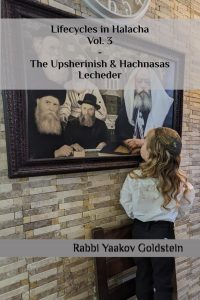8. Teaching one’s son verses of Torah:[1]
Although a child is exempt from all the Mitzvos, and even the father is not Biblically obligated to educate him in Mitzvos, but rather only Rabbinically, nevertheless, teaching Torah to one’s son is a Biblical positive command. The father is commanded to teach his small son Torah, even though the son himself is not obligated [to learn Torah or keep Mitzvos, and has not yet even reached the age of Chinuch[2]].[3]
From what age?[4] From what age is a father obligated to teach his son Torah? As soon as one’s son begins to speak[5], his father is Biblically obligated to teach him Torah. [If the father is unavailable to teach his son, then the son is to be taught through an emissary of the father.[6]]
What to teach?[7] At the very beginning, when he first begins to talk, he is to teach him the verse[8] of “Torah Tziva Lanu Moshe” and the first verse[9] from the Parsha of “Shema Yisrael.” [Teaching these verses root into the young child belief in Hashem and love of the Torah.[10]] Afterwards, he is to teach him other verses, one verse at a time, so that the child knows them by heart. [Some are accustomed to teach him the verse of “Shema Beni Musar Avicha.”[11] When reciting a verse with G-d’s name, Hashem’s name is to be recited properly in order to teach the child how to say it.[12] There is no issue with teaching a child to say these verses by heart.[13] There is likewise no issue with teaching the child the verses at night.[14]]
_____________________________________________[1] Admur Hilchos Talmud Torah 1:1; Michaber Y.D. 245:5; Rambam 1:5; Kiddushin 29a; Shevach Habris 3:3; Nitei Gavriel 17:1 footnotes 1-2
[2] See Piskei Dinim Tzemach Tzedek 350
[3] The reason: As the verse states “Ulimadetem Osam Es Bneichem Lidaber Bam.” [Admur ibid]
[4] Admur Hilchos Talmud Torah 1:1; Michaber 245:5; Rambam Talmud Torah 1:6; Sifri Eikev 11; Sukkah 42a
[5] This is approximately at two years old. [Likkutei Sichos 21:343 footnote 40 based on Radak] Others say it is when the child knows how to speak fluently, which is approximately at age 4. [Aruch Hashulchan 245:2] See Menoras Hamaor Ner 3 Kelal 2:2; Nitei Gavriel 17:8
[6] See Admur Hilchos Talmud Torah 1:4 and 9; Kuntrus Achron 1:1; Nitei Gavriel 17:7
[7] Admur Hilchos Talmud Torah 1:1; Michaber 245:5; Rambam Talmud Torah 1:6; Sifri Eikev 11; Sukkah 42a
[8] Devarim 33:4
[9] Devarim 6:4
[10] Igros Kodesh Rashab 2:483
[11] Mordechai Sukkah 763; Ravayah 799; Or Zarua 317 in name of Yerushalmi; Nitei Gavriel 17:2
[12] Nitei Gavriel 17:3; However, regarding his sources, seemingly they are superfluous, as a Pasuk is not a Bracha, and even with adults there is never an issue to say Hashem’s name in a Pasuk: See Admur 156:2; 188:12; 215:3; Seder 13:4; Luach 12:10; Encyclopedia Talmudit Vol. 4 Erech Bracha Sheiyno Tzericha pp. 261-266; Sheilas Yaavetz 81, brought in Shaareiy Teshuvah 215:4; Chesed Lealafim 215:7; Pela Yoeitz Shem Shamayim; P”M 215 A”A 5; Torah Leshma 496; Shoel Umeishiv Kama 3:53; Hisorerus Teshuvah 1:4; Toras Chaim Sofer 215:5; M”B 215:14; Maharil Diskin KU”A 104; See Or Letziyon 2:14-36; Yabia Omer 3:14; Yechaveh Daas 3:13; Tzitzi Eliezer 13:1; Mishneh Halachos 4:27; Piskeiy Teshuvos 215:10; See Admur 156:2; 188:12; 215:3
[13] See Admur Hilchos Talmud Torah 1:1 “Nekudos Vitaamim Baal Peh”; Admur 49:2; Machzor Vitri 508; Ravayah 42; Gittin 60a; Nitei Gavriel 17:5
[14] See Admur Hilchos Talmud Torah 1:10 “Umiktzas Min Halayla”; Michaber Y.D. 245:1; Chida in Pesach Eiynayim Hashmatos Brachos 2, brought in Ben Ish Chaiy Pekudei 7; Sefer Shemiras Haguf Vihanefesh [Lerner] 84:6; Nitei Gavriel 17:6



Leave A Comment?
You must be logged in to post a comment.